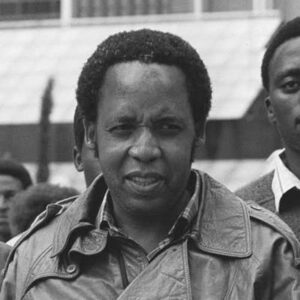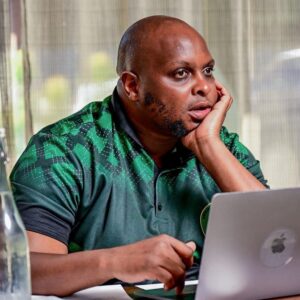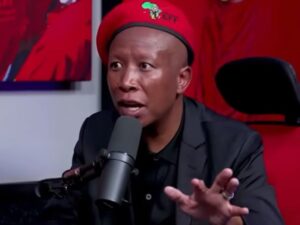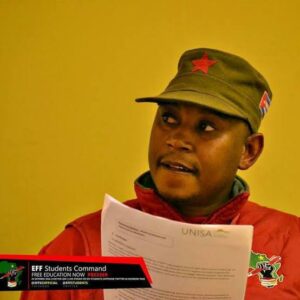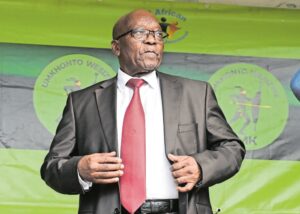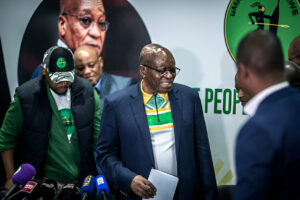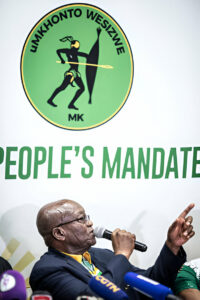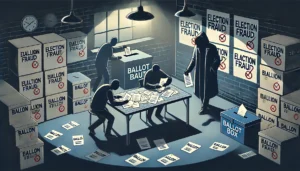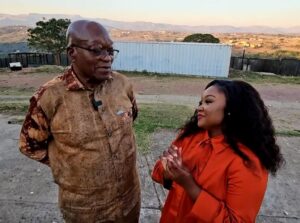Recent revelations have brought to light the intricate ties and controversial views within the uMkhonto Wesizwe (MK) party, further unsettling the South African public. Jacob Zuma, the party’s prominent figure, has stirred controversy with his statements on teenage pregnancy and same-sex marriage. Additionally, Nhlamulo Ndhlela, the party’s spokesperson, has been identified as the nephew of former South African Revenue Service (SARS) commissioner Tom Moyane. This connection is noteworthy as Ndhlela previously secured a contract from SARS, which was later annulled, through a company he was associated with.
In 2016, investigative reports uncovered that a company linked to Moyane’s nephew was awarded a contract by SARS worth R2.2-billion for tax collection, potentially benefiting him by around R220-million. This company was managed by Ndhlela, who has been actively involved in MK’s public relations.
Ndhlela confirmed his relationship with Moyane but distanced himself from any wrongdoing in the contract acquisition process. He highlighted that his application clearly indicated Moyane as a reference and denied knowledge of the selection committee’s composition. Despite this, the contract’s legitimacy was challenged, leading to its cancellation.
The Nugent Commission’s findings further implicated Moyane and the consultancy firm Bain in deliberately undermining SARS, actions that were seemingly aligned with Zuma’s interests. This association between Moyane and Zuma, along with the deliberate weakening of SARS, underscores the complex web of relationships and interests within the political landscape of South Africa.
Recently, Ndhlela disclosed that the establishment of the new political party, which is now attracting significant attention and support from grassroots communities eager for transformation, was the culmination of four years of clandestine efforts.
Should it be true that Zuma had been an active participant in uMkhonto Wesizwe during that period, it implies his dual role of attending ANC National Executive Committee meetings in a passive capacity while simultaneously contributing to a movement poised as a contender to the ANC.
In a related development, Zuma addressed the issue of teenage pregnancies during a gathering with traditional leaders in KwaZulu-Natal. He proposed an unconventional solution of relocating the youth to Robben Island for their education, aiming to curtail the trend of teenage pregnancies.
He characterized teenage pregnancies as a pervasive issue, lamenting the scenario where young individuals may have multiple children without the presence of a responsible father or marital ties, suggesting a societal challenge that requires urgent and innovative solutions.
Zuma’s past is marked by several personal controversies that warrant reflection. Among these, his engagement in unprotected sexual relations with a fellow activist’s daughter, following which he took a shower to mitigate the risk of HIV infection, only to later confront allegations of rape.
A notable incident in 2006 involved Judge Jeremiah Shongwe stepping down from a case due to Zuma’s previous liaison with Shongwe’s sister, resulting in the birth of Edward Zuma. This connection did not inhibit Zuma from later appointing Shongwe to a significant judicial position during his presidency.
By 2010, Zuma’s liaison with Sonono Khoza led to the birth of a child, further entwining his personal affairs with public scrutiny. Another relationship, in 2018, with the then-aspiring reality TV personality Nonkanyiso Conco, produced a child, despite the significant age gap—Zuma being 78 and Conco presumed to be in her mid-20s.
The extent of Zuma’s involvement in the child’s life remains unclear.
Addressing the issue of teenage pregnancy, Ndhlela clarified that the notion of sending pregnant teens to Robben Island does not reflect the official stance of the MK. He elaborated that Zuma, in his advice to the youth, adopts a metaphorical approach to emphasize seriousness, akin to warning a child with an exaggerated consequence.
Ndhlela also revisited Zuma’s contentious remarks on gay marriage, highlighting that Zuma’s perspective was shaped by queries from traditional leaders and does not represent a departure from previous engagements with the topic. He further contrasted the acceptance of polygamy with the legal recognition of gay marriage, questioning the disparity in societal acceptance.
Ndhlela affirmed that neither MK nor Zuma seeks to challenge the legality of gay marriage, emphasizing that societal norms and constitutional matters lie beyond the purview of individual opinions or organizational policies.
A core issue emerges, strikingly discordant with Zuma’s derogatory stance on gay marriage, which he labels a “disgrace.”
This scenario underscores a profound challenge confronting the MK organization.
Zuma, despite not being its legal founder, casts a long shadow over the party, elevating it to a level of prominence solely attributed to his influence. In his absence, the party would likely fade into obscurity, with minimal public discourse surrounding it.
Hence, his utterances on societal matters are often misconstrued as the official stance of MK.
This is compounded by the fact that other party leaders, absent from the national conversation due to their limited visibility, fail to counterbalance Zuma’s influence. Consequently, Zuma becomes the de facto reference point for understanding the party’s ethos.
Ndhlela is the solitary exception, frequently cited by the media, which inevitably brings his past actions into focus.
This situation conveniently serves the narrative of MK’s detractors, who depict the party as nothing more than a conduit for Zuma’s ambitions and a reflection of his discontent following his political ouster.
